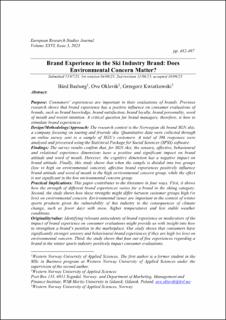| dc.description.abstract | Purpose: Consumers’ experiences are important in their evaluations of brands. Previous research shows that brand experience has a positive influence on consumer evaluations of brands, such as brand knowledge, brand satisfaction, brand loyalty, brand personality, word of mouth and revisit intention. A critical question for brand managers, therefore, is how to stimulate brand experiences Design/Methodology/Approach: The research context is the Norwegian ski brand SGN skis, a company focusing on touring and freeride skis. Quantitative data were collected through an online survey sent to a sample of SGN’s customers. A total of 386 responses were analysed and processed using the Statistical Package for Social Sciences (SPSS) software. Findings: The survey results confirm that, for SGN skis, the sensory, affective, behavioural and relational experience dimensions have a positive and significant impact on brand attitude and word of mouth. However, the cognitive dimension has a negative impact on brand attitude. Finally, this study shows that when the sample is divided into two groups (low vs high on environmental concern), affective brand experiences positively influence brand attitude and word of mouth in the high environmental concern group, while the effect is not significant in the low environmental concern group. Practical Implications: This paper contributes to the literature in four ways. First, it shows how the strength of different brand experiences varies for a brand in the skiing category. Second, the study shows how these strengths might differ between customer groups high (vs low) on environmental concern. Environmental issues are important in the context of winter sports products given the vulnerability of this industry to the consequences of climate change, such as fewer days with snow, higher temperatures and less stable weather conditions. Originality/value: Identifying relevant antecedents of brand experience or moderators of the impact of brand experience on consumer evaluations might provide us with insight into how to strengthen a brand’s position in the marketplace. Our study shows that consumers have significantly stronger sensory and behavioural brand experiences if they are high (vs low) on environmental concern. Third, the study shows that four out of five experiences regarding a brand in the winter sports industry positively impact consumer evaluations. | en_US |

